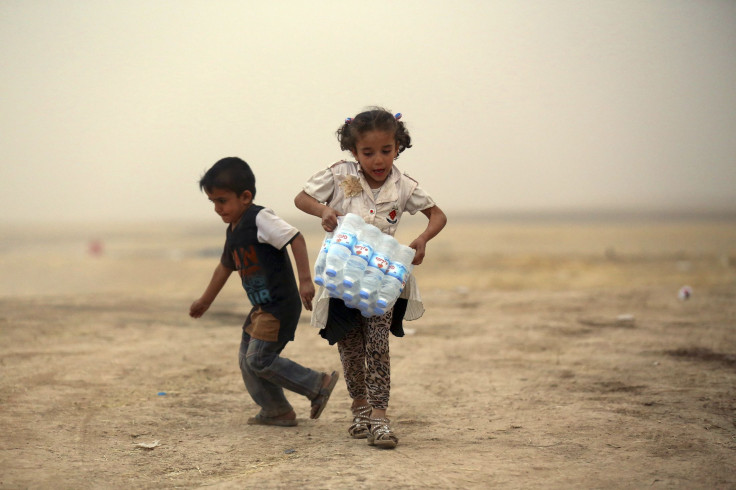ISIS Kidnaps More Than 130 Syrian Schoolchildren; International Leaders Yet To Respond

More than 130 children have been kidnapped by the Islamic State of Iraq and Syria (ISIS), inside Syria’s town of Manbij. The children have been missing for a month, yet their kidnapping has gone largely unnoticed.
According to a Human Rights Watch report, ISIS abducted 153 children between the ages of 13 and 14 from the mostly Kurdish town of Ain al-Arab on May 29. The children were returning home from taking their year-end exams in the city of Aleppo when they were abducted.
The kidnapping, by a group that many consider to be a terrorist organization (though the U.S. has yet to officially declare ISIS as such), comes just two months after another terrorist organization, Boko Haram, based in Nigeria, kidnapped more than 200 girls from their school in Chibok. After their kidnapping, the international community took note of the social media #BringBackOurGirls campaign, which effectively raised awareness of the crisis. But the kidnapping in Syria did not receive the same attention. Max Abrahms, a terrorism expert from Northeastern University in Boston, said the Syrian kidnapping case wasn't reported because the war, quite simply, has exhausted readers and international leaders.
“Generally speaking, hostage taking doesn’t really lead the news,” he said.
Yet, with the kidnapping of the schoolgirls in Nigeria, the U.S. went as far as sending 80 soldiers to Chad to assist in searching for the children. Other nations helped the Nigerian government with satellite information. Until now, though, the U.S. has not acknowledged the Kurdish children’s’ kidnapping in Syria.
“Terrorism terrorizes by using violence out of the blue," Abrahms said. "When a conflict is protracted and people are knowledgeable that there are high levels of conflict, attention declines.”
Essentially, Abrahms said, the U.S. and other nations are exhausted with the crisis, which has been going on for more than three years. Though violence has occurred in Nigeria for years, the massive abduction seemed to shock the international community into assisting the search for the missing girls. It seems, then, that there are not many events in Syria that could shock the West into action.
“There is so much violence there in Syria, even big attacks can go unseen,” Abrahms said.
According to U.N. estimates, more than 160,000 people have been killed in the Syrian conflict so far, and millions have been displaced. Kidnappings inside the country have developed over the past few years as well. Opposition fighters based in Turkey but operating within Syria have resorted to kidnapping members of other groups for ransom, and both the opposition and the Syrian military have kidnapped foreign journalists. Austin Tice and James Foley, two U.S. freelance journalists, are still missing in the country.
The journey to take the exams on May 29 required the children to pass through territory controlled by ISIS. At least 1,000 students traveled to Aleppo in buses and mini-buses. ISIS allowed the convoy to proceed to Aleppo, but it stopped the first group that returned in the town of Manbij. At this juncture, ISIS fighters separated the boys from the girls and sent the girls home with the drivers. About 100 girls from the class returned to Ain al-Arab, Ali said. The rest of the children stayed in Aleppo and eventually returned safely to Ain al-Arab via other routes, but 153 of the ninth-grade boys were forced to remain in Manbij.
According to various media reports and the Syrian Observatory for Human Rights, one of the only operational human rights groups in Syria, ISIS released 15 of the children on June 28 in exchange for the release of ISIS fighters held by the People’s Protection Units (YPG), or the official armed wing of the Kurdish Supreme Committee.
“Terrorist groups have two kinds of goals," Abrahms said. “They have strategic goals, which are reflected in the political demands, but all terrorist groups also have organizational goals such as gaining money. Usually the government doesn’t find the demands prohibitively hard to comply with when they are financial. But it is much more difficult when the hostage takers request [that] the government free militants in its custody.”
For this reason, Abrahms said he did not think ISIS is acting as other terrorist organizations have in the past. The group, he said, is waging indiscriminate attacks, angering local populations and allowing anyone to join the fight.
"Terrorist groups are more successful when they are not indiscriminate and they restrict their targets to unpopular people," Abrahms said. "I think that both groups, ISIS and Boko Haram, are way too indiscriminate and it is just a matter of time before the population turns against them and rivals take them on."
© Copyright IBTimes 2024. All rights reserved.











